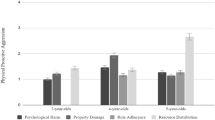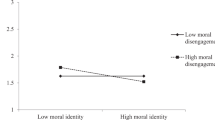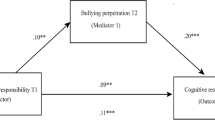Abstract
Much recent research on moral judgment making has focused on quick one-shot judgments. Explicit reasoning has been shown to play a minor role in these cases. However, these results do not generalize to real moral conduct that often includes the iterative adaptation of long-term behavioral strategies. I suggest using school bullying as an ecologically valid model for moral conduct and refer to studies that show that moral reasoning competence is negatively correlated to immoral aggressive behavior. Taken together, these results suggest a rather strict division of labor between reasoning on the one hand and automatic processes on the other hand. I suggest that moral reasoning is part of a long-term learning process, which sets the parameters for quick intuitive decision making. Philosophical ethics can play an important role by systematizing and reflecting this learning process.
Access this chapter
Tax calculation will be finalised at checkout
Purchases are for personal use only
Preview
Unable to display preview. Download preview PDF.
Similar content being viewed by others
References
Aristotle (2014). Nicomachean Ethics (trans: C.D.C. Reeve). Indianapolis, Cambridge: Hackett.
Bargh, J. A., & Chartrand, T. L. (1999). The unbearable automaticity of being. American Psychologist 54, 462–479. doi:10.1037/0003-066X.54.7.462.
Colby, A., & Kohlberg, L. (1987). The Measurement of Moral Judgement: Volume 2, Standard Issue Scoring Manual. Cambridge University Press.
Craigie, J. (2011). Thinking and feeling: Moral deliberation in a dual-process framework. Philosophical Psychology 24(1), 53–71. doi:10.1080/09515089.2010.533262.
Cushman, F., Young, L., & Hauser, M. (2006). The Role of Conscious Reasoning and Intuition in Moral Judgment: Testing Three Principles of Harm. Psychological Science 17(12), 1082–1089. doi:10.1111/j.1467-9280.2006.01834.x.
Cushman, F., Murray, D., Gordon-McKeon, S., Wharton, S., & Greene, J. D. (2011). Judgment before principle: engagement of the frontoparietal control network in condemning harms of omission. Social Cognitive and Affective Neuroscience 7(8), 888–895. doi:10.1093/scan/nsr072.
Dahlkamp, J., Friedmann, J., Ulrich, A., & Windmann, A. (2013). Ich oder keiner. Der Spiegel 2013(11), pp. 58–65.
Dancy, J. (2006). Ethics Without Principles. Oxford: Oxford University Press.
Doris, J. M. (2010). The Moral Psychology Handbook. Oxford: Oxford University Press.
Glöckner, A., & Betsch, T. (2008). Modeling option and strategy choices with connectionist networks: Towards an integrative model of automatic and deliberate decision making. Judgment and Decision Making 3(3), 215–228.
Greene, J. D. (2001). An fMRI Investigation of Emotional Engagement in Moral Judgement. Science 203, 2105–2108.
Greene, J. D. (2007). The secret joke of Kant’s soul. In W. Sinnott-Armstrong (Ed.), The Neuroscience of Morality: Emotion, Brain Disorders, and Development (pp. 35–79). Cambridge, Mass.: MIT Press.
Greene, J. D. (2014). Beyond point-and-shoot morality: Why Cognitive (Neuro)Science Matters for Ethics. Ethics 124(4), 695–726.
Gummerum, M., Keller, M., Takezawa, M., & Mata, J. (2008). To Give or Not to Give: Children’s and Adolescents’ Sharing and Moral Negotiations in Economic Decision Situations. Child Development 79(3), 562–576. doi:10.1111/j.1467-8624.2008.01143.x.
Haidt, J. (2001). The emotional dog and its rational tail: a social intuitionist approach to moral judgment. Psychological Review 108(4), 814–834. doi:10.1037//0033-295X. 108.4.814.
Haidt, J. (2012). The righteous mind: why good people are divided by politics and religion. London: Allen Lane.
Haidt, J., Björklund, F., & Murphy, S. (2000). Moral dumbfounding: When intuition finds no reasons. Unpublished manuscript.
Graham, J., Haidt, J., Koleva, S., Motyl, M., Iyer, R., Wojcik, S. P., & Ditto, P. H. (2013). Moral Foundations Theory: The Pragmatic Validity of Moral Pluralism, Advances in Experimental Social Psychology (47), 55–130. doi: 10.1016/B978-0-12-407236-7.00002-4.
Hamburger Abendblatt (2011, August 25). U-Bahnschläger: Keiner half dem mutigen Retter. Hamburger Abendblatt. Retrieved from http://www.abendblatt.de/vermischtes/article2003639/U-Bahnschlaeger-Keiner-half-dem-mutigen-Retter.html.
Harman, G., Mason, K., Sinnott-Armstrong, W., & Doris, J. M. (2012). Moral Reasoning. In J.M. Doris et al. (Eds.), The Moral Psychology Handbook (pp. 206–245). Oxford: Oxford University Press.
Hauser, M., Cushman, F., Young, L., Kang-Xing, J., & Mikhail, J. (2007). A Dissociation Between Moral Judgments and Justifications. Mind Language 22(1), 1–21.
Helion, C., & Pizarro, D. A. (in press). Beyond dual-processes: The interplay of reason and emotion in moral judgment. In N. Levy, & J. Clausen (Eds.), Handbook of Neuroethics. Springer.
Jonas, K. J., & Brandstätter, V. (2004). Zivilcourage. Zeitschrift für Sozialpsychologie 35(4), 185–200. doi:10.1024/0044-3514.35.4.185.
Jones, K. (2003). Emotion, weakness of the will and the normative conception of agency. In A. Hatzimoysis (Ed.), Philosophy and the Emotions (pp. 181–200). Cambridge: Cambridge University Press.
Kahane, G. (2012). On the Wrong Track: Process and Content in Moral Psychology. Mind & language 27(5), 519–545.
Kahneman, D., & Frederick, S. (2002). Representativeness Revisited: Attribute Substitution in Intuitive Judgment. In T. Gilovich, D. Griffin, & D. Kahneman (Eds.), Heuristics and Biases: The Psychology of Intuitive Judgment (pp. 49–81). Cambridge: Cambridge University Press.
Kant, I. (2012). Groundwork of the Metaphysics of Morals (trans: M. Gregor & J. Timmermann). Cambridge: Cambridge University Press. (Original work published 1785).
Kennett, J., & Fine, C. (2008). Will the Real Moral Judgment Please Stand Up? Ethical Theory and Moral Practice 12, 77–96. doi:10.1007/s10677-008-9136-4.
Killen, M. (2007). Children’s Social and Moral Reasoning About Exclusion. Current Directions in Psychological Science 16(1), 32–36. doi:10.1111/j.1467-8721.2007.00470.x
Kohlberg, L. (1984). Essays on Moral Development. Vol. II: The Psychology of Moral Development. San Francisco: Harper & Row.
Kohlberg, L., & Candee, D. (1983). The Relationship of Moral Judgment to Moral Action. In L. Kohlberg (Ed.), The Psychology of Moral Development: The Nature and Validity of Moral Stages (pp. 498–581). San Francisco: Harper & Row Publishers [1984].
Korsgaard, C. M. (1996). The Sources of Normativity. Cambridge: CUP.
Levy-Suhl, M. (1912). Die Prüfung der sittlichen Reife jugendlicher Angeklagter und die Reformvorschläge zum §56 des deutschen Strafgesetzbuches. Zeitschrift für Psychotherapie 232–254.
Lind, G. (2003). Moral ist lehrbar: Handbuch zur Theorie und Praxis moralischer und demokratischer Bildung. München: Oldenbourg.
Lind, G. (2008). The meaning and measurement of moral judgment competence. A dual-aspect model. In D. Fasko & W. Willis (Eds.), Contemporary philosophical and psychological perspectives on moral development and education (pp. 185–220). Creskill: Hampton Press.
Lind, G. (2009). Moral Judgment Test (MJT) – English Version. Available from the author upon request (contact: http://www.uni-konstanz.de/ag-moral/mut/mjt-engl.htm).
May, J. (2014). Does Disgust Influence Moral Judgment? Australasian Journal of Philosophy 92(1), 125–141.
Mercier, H., & Sperber, D. (2011). Why do humans reason? Arguments for an argumentative theory. Behavioral and Brain Sciences 34(02), 57–74. doi:10.1017/S0140525X10000968.
Nucci, L. (1981). Conceptions of Personal Issues: A Domain Distinct from Moral or Societal Concepts. Child Development 52(1), 114–121. doi:10.2307/1129220
Nunner-Winkler, G. (2009). Prozesse moralischen Lernens und Entlernens. Zeitschrift für Pädagogik 55(4), 528–548.
Olweus, D. (1993). Bullying at School: What we know and what we can do. Oxford, Cambridge, Mass.: Blackwell.
Paxton, J. M., Ungar, L., & Greene, J. D. (2012). Reflection and Reasoning in Moral Judgment. Cognitive Science 36(1), 163–177. doi:10.1111/j.1551-6709.2011.01210.x.
Pettit, P. (2007). Neuroscience and Agent Control. In D. Ross, D. Spurrett, H. Kincaid, & G. L. Stephens (Eds.), Distributed Cognition and the Will: Individual Volition and Social Context (pp. 77–91). Cambridge, Mass., London: A Bradford Book.
Piaget, J. (1997). The Moral Judgment of the Child (trans: M. Gabain). New York: Free Press. (Original work published 1932.)
Prinz, J. (2006). The Emotional Basis of Moral Judgement. Philosophical Explorations 9, 29–43.
Railton, P. (2009). Practical competence and fluent agency. In D. Sobel & S. Wall (Eds.), Reasons for action (pp. 81–115). Cambridge: Cambridge University Press.
Rawls, J. (1971). A Theory of Justice. Cambridge, Mass.: Harvard University Press.
Richardson, C. B., Mulvey, K. L., & Killen, M. (2012). Extending Social Domain Theory with a Process-Based Account of Moral Judgments. Human Development 55(1), 4–25. doi:10.1159/000335362.
Salmivalli, C., Lagerspetz, K., Björkqvist, K., Österman, K., & Kaukiainen, A. (1996). Bullying as a group process: Participant roles and their relations to social status within the group. Aggressive Behavior 22(1), 1–15.
Sauer, H. (2012). Psychopaths and Filthy Desks. Ethical Theory and Moral Practice 15(1), 95–115.
Schäfer, M., & Korn, S. (2004). Bullying als Gruppenphänomen. Zeitschrift für Entwicklungspsychologie und pädagogische Psychologie 36(1), 19–29.
Schäfer, M., Korn, S., Smith, P. K., Hunter, S. C., Mora-Merchán, J. A., Singer, M. M., & Meulen, K. (2004). Lonely in the crowd: Recollections of bullying. British Journal of Developmental Psychology 22(3), 379–394. doi:10.1348/0261510041552756.
Schäfer, M., von Grundherr, M., & Sellmaier, S. (in press). Mobbing. In J. Sautermeister (Ed.), Moralisches Können: Transdisziplinäre Perspektiven und ethische Herausforderungen der Moralpsychologie. Stuttgart: Kohlhammer.
Smetana, J. G. (2006). Social-cognitive domain theory: Consistencies and variations in children’s moral and social judgments. In M. Killen & J. G. Smetana (Eds.), Handbook of moral development (pp. 119–154). Mahwah: Erlbaum Associates.
Schwitzgebel, E., & Cushman, F. (2012). Expertise in Moral Reasoning? Order Effects on Moral Judgment in Professional Philosophers and Non-Philosophers. Mind & Language 27(2), 135–153.
Smith, P. K., Singer, M., Hoel, H., & Cooper, C. L. (2003). Victimization in the school and the workplace: Are there any links? British Journal of Psychology 94(2), 175–188.
Stams, G. J., Brugman, D., Deković, M., Rosmalen, L., Laan, P., & Gibbs, J. C. (2006). The Moral Judgment of Juvenile Delinquents: A Meta-Analysis. Journal of Abnormal Child Psychology 34(5), 692–708. doi:10.1007/s10802-006-9056-5.
Turiel, E. (1983). The Development of Social Knowledge: Morality and Convention. Cambridge University Press.
Valdesolo, P., & DeSteno, D. (2006). Manipulations of emotional context shape moral judgment. Psychological Science 17(6), 476–477.
von Grundherr, M., Geisler, A., Stoiber, M. & Schäfer, M. (2015). School bullying and moral reasoning competence. Manuscript submitted for publication.
Wheatley, T., & Haidt, J. (2005). Hypnotic disgust makes moral judgments more severe. Psychological science 16(10), 780–784.
Whitney, I., & Smith, P. K. (1993). A survey of the nature and extent of bullying in junior/middle and secondary schools. Educational Research 35(1), 3–25. doi:10.1080/0013188930350101.
Author information
Authors and Affiliations
Corresponding author
Editor information
Editors and Affiliations
Rights and permissions
Copyright information
© 2016 Springer Fachmedien Wiesbaden
About this chapter
Cite this chapter
Grundherr, M. (2016). Moral Argumentation Skills and Aggressive Behavior. Implications for Philosophical Ethics. In: Brand, C. (eds) Dual-Process Theories in Moral Psychology. Springer VS, Wiesbaden. https://doi.org/10.1007/978-3-658-12053-5_6
Download citation
DOI: https://doi.org/10.1007/978-3-658-12053-5_6
Published:
Publisher Name: Springer VS, Wiesbaden
Print ISBN: 978-3-658-12052-8
Online ISBN: 978-3-658-12053-5
eBook Packages: Religion and PhilosophyPhilosophy and Religion (R0)




